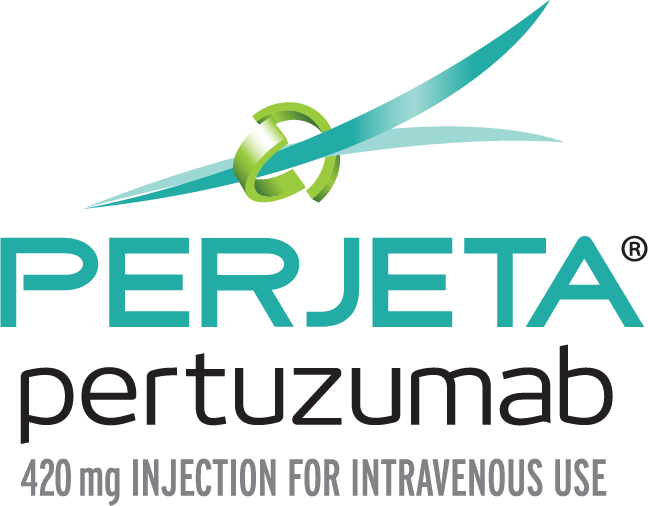The infusion process

PERJETA is given every 3 weeks as an IV infusion
PERJETA is given as an intravenous (IV) infusion, which means that medication is administered directly into the bloodstream through a vein.

PERJETA and Herceptin® (trastuzumab) are given back-to-back at the same visit. You will also get chemotherapy as part of your treatment, but it may be on a different schedule.
If you start PERJETA + Herceptin-based therapy before surgery, you may continue to get it after surgery to complete 1 year (up to 18 cycles).*
*Unless side effects become too difficult to manage, or the cancer comes back sooner.

How long will each infusion last?

Infusion times may vary from person to person depending on tolerability.
After each medication is given, your doctor or nurse will wait 30 to 60 minutes to check for any reactions. If a reaction occurs, they may adjust, delay, or stop treatment.


During your first treatment
The medicines are given more slowly during your first visit. Your first dose of PERJETA will be given as an infusion over 60 minutes. Herceptin will be given over 90 minutes, and chemotherapy infusion times may vary by regimen.

Side effects may occur with PERJETA
PERJETA is given together with Herceptin and chemotherapy, and side effects may occur.
What are the possible serious side effects of PERJETA?
PERJETA can cause heart problems, including those without symptoms (such as reduced heart function) and those with symptoms (such as congestive heart failure).
Receiving PERJETA during pregnancy can result in the death of an unborn baby and birth defects.
Other possible serious and sometimes fatal side effects of PERJETA therapy include:
- Infusion-related reactions
- Severe allergic reactions (hypersensitivity reactions/anaphylaxis)
The most common side effects of PERJETA when given with trastuzumab and chemotherapy prior to surgery for early breast cancer include: constipation; damage to the nerves (numbness, tingling, pain in hands/feet); diarrhea; fatigue; hair loss; headache; decreased red blood cell counts, white blood cell counts, and platelet counts; mouth sores or blisters; nausea; muscle pain; vomiting; and weakness.
The most common side effects of PERJETA when given with trastuzumab and chemotherapy after surgery for early breast cancer include diarrhea, nausea, hair loss, fatigue, damage to the nerves (numbness, tingling, pain in hands/feet), and vomiting.
Side effects may vary based on chemotherapy regimen.
Talk to your doctor about any side effects you experience. Here are some tips you can try.
Remember, the tips mentioned below may not work for everyone. Be sure to talk with your doctor or other healthcare provider before trying any of these tips.
Select side effects associated with PERJETA + Herceptin-based therapy during early breast cancer treatment
When you have diarrhea, it means you have loose or watery bowel movements that happen 3 or more times in a day.
Some tips you can try:
- Choose nutritious foods, rather than foods that are greasy, fatty, or spicy
- Eat small, frequent meals that are easy to digest, such as rice, applesauce, and canned fruit
- Drink plenty of clear, noncarbonated fluids
- Eat foods high in potassium, such as bananas or potatoes, or drink sports drinks
You may become constipated during treatment and find you have difficulty having a bowel movement.
Some tips you can try:
- Drink plenty of fluids
- Eat high-fiber foods, such as whole-grain breads and cereals, fruits and vegetables, and nuts, seeds, and popcorn
- Be physically active if you can
Fatigue is a feeling of being tired or exhausted that may affect your ability to perform normal activities.
Some tips you can try:
- Be physically active each day, if your doctor approves. This may help improve your appetite, strength, and weight
- Participate in activities during the times of day when you have more energy
- Do the most important tasks first
Hair loss (also called alopecia) may happen on any part of the body. It may happen suddenly or a little at a time, and may cause the hair to become thin, dry, or dull.
Some tips you can try:
- Use a mild shampoo, and try not to wash your hair every day
- Avoid perming, curling, straightening, or blow-drying with high heat
- Apply a broad-spectrum sunscreen to the scalp, or cover the scalp with a sun-protective hat or scarf when outside
Nausea is when you feel sick to your stomach. This can lead to vomiting—when you throw up.
Some tips you can try:
- Try relaxation techniques, such as deep breathing or thinking of a positive image or scene, to distract you from feeling sick to your stomach
- Choose foods that are nutritious and avoid foods that are greasy, fried, salty, sweet, or spicy
- If the smell of a food bothers you, try cooling it down before eating it
Be aware that these are not all of the side effects associated with PERJETA. For more information, please review the PERJETA Important Safety Information and the full Prescribing Information.
You are encouraged to report side effects to Genentech and the FDA. You may contact Genentech by calling 1-888-835-2555. You may contact the FDA by visiting www.fda.gov/medwatch or calling 1-800-FDA-1088.
Discover information and resources to help you have an informative conversation with your doctor.
PERJETA Access Solutions may be able to help you get the PERJETA you need, even if you cannot pay for it.
